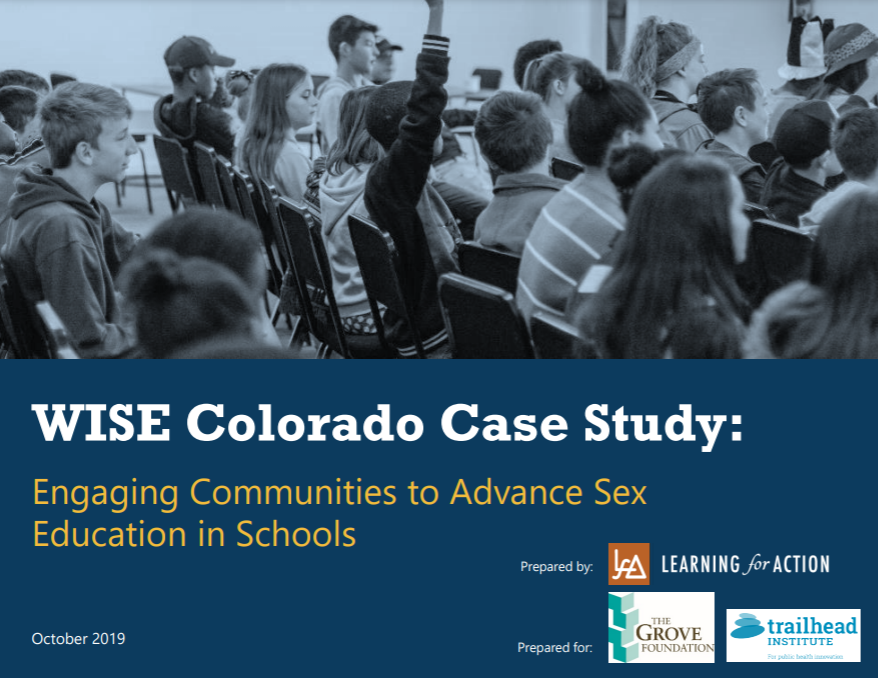Reflecting on Community Engagement at Trailhead
Trailhead’s vision is to cultivate a Colorado where everyone has the opportunity to be healthy and live in a healthy environment. In 2019, we established three strategic goal areas to help us achieve this vision through our programmatic, administrative partnership and advocacy work as a public health institute. These goals are to: create a common value for preventing what makes people sick and promoting what makes people well; build long-term investment solutions and strategies for public health; and engage and activate diverse partners in public health.
When we ask ourselves how we are accomplishing these three strategic goal areas, community engagement is routinely named as a central practice throughout our various programs, projects and partnerships, and is credited as a core component of our success.
Earlier this month, we gathered as a team to discuss our approach to community engagement and re-root ourselves in the principles of the practice. From the conversation arose meaningful questions such as how do we define community engagement? How do we show up as a thought partner, collaborator or an administrative partner when thinking about our relationship to community? What does community engagement look like in action?
In an effort to demystify terms and to build a practical understanding of our community engagement approach, our October newsletter offers reference points, reflections and examples of community engagement as it shows up in our work with the aim of supporting thriving communities.
Community Engagement as a Mindset
Trailhead’s Director of Philanthropy & Community Engagement, Holly Coleman acknowledges some personal resistance around putting a concrete definition and terms on what community engagement is. Rather, she offers that community engagement is more about how we show up and can be understood as a mindset when working in community.
With this in mind, Holly offered a definition from the Tamarack Institute that aligns with Trailhead’s perspective of community engagement as both a continuous practice and a mindset:
“Citizens [community members] engaged in inspired action as they work and learn together on behalf of their communities to create and realize bold visions for the future.” – Tamarack Institute
From this definition we look at the beliefs that shape how we show up in and engage with communities.
What Drives Our Work
While we may utilize different approaches when working with communities to address their unique health needs, these core underlying beliefs guide how we engage with communities across the state regardless of program, project or initiative:
- We believe that every community member matters and has lived and/or professional experiences that are essential to determining collective solutions to the health issues that they face
- We believe that communities are already full of expertise, assets and answers in the public health issues they seek to address
- We believe in supporting processes and models that allow for communities to have ownership over the outcomes, which ultimately impact them
Within the context of Trailheads strategic goal areas, these beliefs recognize that creating a common value for preventing what makes people sick and promoting what makes people well is shaped by the cultures, values and needs that are present in communities. Therefore creating long-term strategies for public health must center the voices and expertise of community members with diverse lived experiences and prioritize solutions that have community support and can be sustained over time.
Community Engagement in Action: Highlighting the Work of WISE Colorado
Trailhead’s Youth Sexual Health Program utilizes the WISE (Working to Institutionalize Sex Education) approach to community engagement, a national initiative that recognizes that community engagement looks different in each district and is essential for changing the sex ed landscape in schools.
Trailhead leads the work of WISE Colorado with awareness that cultivating support for and commitment to sex ed is done most effectively when local leaders champion the efforts alongside building support among parents, guardians and district leadership. This process relies on community engagement strategies that center the community through: listening; facilitating open conversations with stakeholders that address their questions, concerns and priorities around implementing or enhancing sex ed; centering messaging on the common goal of supporting young people, and; building school district support to ensure the work is sustainable.
As experts in sex ed from content and policy to training and technical assistance, Trailhead facilitates the WISE Colorado process to guide, support, build strength and share resources with school districts interested in improving youth sexual health education.
To learn more about the common community engagement strategies that WISE Colorado utilizes and their impact, read our WISE Colorado Case Study: Engaging Communities to Advance Sex Education in Schools through the button below.
Perspectives on Community Engagement from Trailhead’s Gabe Rodriguez, Hannah Groves and Kristy Beachy-Quick
Gabe Rodriguez
Community engagement is authentic listening to those closest to the pain, recognizing your level of privilege when engaging with communities outside of your identities, and using your privilege towards dismantling the systems of oppression that impact us all.
Hannah Groves
I am inspired in my community engagement approach by adrienne marie brown, Sonya Renee Taylor, Aiko Bethea and others who encourage collaboration, compassion, justice, and shared action. These activists also emphasize the transformative power of relationships, especially when relationships are given time and space. For the Regional Health Connector (RHC) program, each RHC’s relationship with their communities is unique and transformative, building and leveraging these relationships every day to connect the systems that keep us healthy. I’m honored to help support those connections and relationships. A few other key commitments of authentic engagement include: self-reflection and self-awareness; being intentional, inclusive, and honest through planning and implementation; compensating people for their time; building in participatory and capacity-building opportunities; deeply listening to others; and, finally, making engagement fun!
Kristy Beachy-Quick
Community engagement requires listening, which requires trust, which requires showing up in authentic ways. As ‘professionals’ we need to offer meaningful resources in ways that honor the strengths and gifts of community partners.

